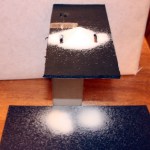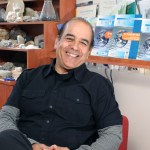education
Paige Brown Jarreau, who blogs at From the Lab Bench is in the throes of writing her dissertation about science blogging, and plowing through a lot of interview data. She's sharing some of the process on the blog, and a lot more on Twitter, where it's prompted a good deal of discussion.
One of the big things she's brought up recently is the question of why scientists seem to blog about their own research only on rare occasions (Storify link). My own answer is in there somewhere: blogging about something you're actively working on doesn't feel like a departure from doing work. If you're going…
A sort of follow-up to last week's post about the STEM "pipeline". In discussions on Twitter sparked by the study I talked about last week, I've seen a bunch of re-shares of different versions of this graph of the percentage of women earning undergrad degrees in physics:
Fraction of BA/BS degrees in physics awarded to women over time. From AIP Statistical Research.
You can clearly see that after a fairly steady rise through the 80's and 90's, this trend has flattened out over the last decade. If you crop the horizontal axis to start in the early 2000's, you can actually see a decline from…
Over at Quantum Progress there was a recent series of guest posts about a social-justice-in-physics curriculum used by high school teacher Moses Rifkin. I sort of glanced at it, said "Huh, that's sort of interesting," and moved on, but this got picked up by some right-wing sites, and exploded. To the point where the awful people on Fox's awful morning show did a segment hating on it.
The angle of attack is, of course, that this is wasting time that ought to be spent on teaching physics. And, you know, I applaud Fox News's sudden concern for the teaching of physics-- if they'd like to have me…
Via Curt Rice (or, more precisely, somebody on Twitter who posted a link to that, but I didn't note who) there's a new study in Frontiers in Psychology of the STEM "pipeline", looking at the history of gender disparities in STEM degrees. You can spin this one of two ways, the optimistic one being "Women now continue on from bachelors degrees to Ph.D.'s at the same rate as men!" and the pessimistic one being, well, Rice's post.
The accurate description, as is often the case in social science, "This stuff is really messy and confusing." Rather than being a set of nice straight pipes going from…
In 2010, New York City health officials launched a new food safety tactic that assigned restaurants an inspection-based letter grade and required that the grade be posted where passersby could easily see it. So, did this grading make a difference? A new study finds that it has, with the probability of restaurants scoring in the A-range up by 35 percent.
To conduct the study, researchers with the New York City Department of Health and Mental Hygiene examined data from more than 43,400 restaurants inspected between 2007 and 2013. A restaurant’s score is based on how well it complies with local…
When the U.S. Food and Drug Administration approved the first vaccine to protect against cancers caused by certain strains of the human papillomavirus, or HPV, public health advocates cheered its arrival and life-saving potential. Unfortunately, the new vaccine quickly became embroiled in a debate over whether immunizing young girls against HPV, a sexually transmitted disease, would lead to risky sexual behavior. A new study, however, finds that the vaccine is not associated with an uptick in STDs — an indicator that HPV immunization does not promote unsafe sex.
To conduct the study, which…
This was a good week for "Chad bristles at side issues of massively reshared stories," with the Vox and gender bias stories, and also this PBS piece urging parents to tell their kids science stories. That probably seems surprising, given what I do around here, but while I fully endorse the end of that piece, the opening section in which Wendy Thomas Russell explains why she never liked science mostly makes me think that she's an awful person. She attributes her lack of interest in science to bad teaching, and provides a series of examples ending with:
Later, at the University of Nebraska, I…
I've seen a lot of reshares of this report about the long-term effect of gender bias in elementary math, which comes from an NBER working paper about a study of Israeli schools. The usual presentation highlights one specific result, namely that on a math test graded by teachers who knew the names of the students, boys outscored girls, but a blinded test saw girls outscore boys.
This sounds pretty damning, but also kind of puzzling-- is there really that much room for partial credit in elementary school math? Looking at the actual paper (which you can get emailed to you if you have a .edu…
It’s a persistent conundrum in the field of public health — how can we open people’s minds to positively receiving and acting on health information? Previous research has found that combining health tips with messages of self-affirmation may be a particularly effective strategy, but researchers weren’t entirely sure how self-affirmation worked at the neurological level. Now, a new study has found that self-affirmation’s effects on a particular region of the brain may be a major key to behavior change.
In even simpler terms, researchers involved this new study — which examined how self-…
Over at Scientific American's Frontiers for Young Minds blog, they have a great post on what happens when you ask scientists to explain key elements of a different research field. It's pretty funny, and rings very true, as SteelyKid asks me tons of science questions, very few of which have anything to do with atomic, molecular, or optical physics. so I spend a lot of time faking my way through really basic explanations of other fields.
Of course, even pitching stuff from my own field at the right level for small kids is a challenge. Which reminds me, I never did explain my presentation for…
Math with Bad Drawings has a post about "word problems" that will sound very familiar to anyone who's taught introductory physics. As he notes, the problem with "word problems" for math-phobic students is that it requires translating words into symbols, and then using the symbols to select a procedure. It adds a step to what at a lower level is a simple turn-the-crank algorithm: given this set of symbols, do these abstract operations, and write down the answers.
This is a very familiar problem in intro physics, where I regularly have struggling students tell me "I can do the math just fine, I…
Prof. Nir Orion
Science Teaching researcher Prof. Nir Orion recently returned from Peru, where his award-winning Blue Planet teaching unit was adopted by the Peruvian Ministry of Education
Q: You have been working for many years to get schoolchildren out of the classroom setting. Why?
A: Schools in general and science teaching in particular are supposed to teach children about the world they live in. But they do it in a sterile environment that is disengaged from the real world; and thus many students do not find relevance or personal meaning in the subjects they “learn.”
There are,…
I'm teaching my "Brief History of Timekeeping" class again this term, and as always, I'm tweaking things a bit. This is one of our "Sophomore Research Seminar" courses, intended to introduce students to academic research, so it's not specifically a physics class, but I'm choosing to take the statements about research outside the student's field at face value, and thus will be requiring them to do final projects involving some empirical measurement of the natural world, that being the essence of scientific research. (Last time, I included that as an option, but nobody took it, so I ended up…
"Daddy, ask me a math problem."
"OK. What's 18 plus 6?"
"Ummm... 24."
"Correct."
"See, I just keep the 18 and then add 2 from the 6 to get 20. That leaves 4 from the six, and 20 plus 4 is 24."
"Right. Good work."
------
"Hey, SteelyKid. What's 120 plus 180?"
"Ummm... 300."
"Very good!"
"I just added the hundreds to make 200, and then 80 plus 20 is 100, and then I add them all together to get 300."
"Nice work."
"It takes a little while, though."
"Yes, but you keep practicing, and getting faster."
"Practice makes perfect!"
------
"That would take ten minutes, which is... six hundred seconds."
"…
Yesterday's Open Letter to Neil deGrasse Tyson struck a chord with a lot of people, and has spread a good distance on social media, which is gratifying. Given the delocalized nature of modern social media, though, it means I'm having essentially the same argument in five different places via different platforms. In the interest of consolidating this a tiny bit, then, let me post some follow-up stuff here.
-- The most charitable interpretation of the tweet I objected to is that it's meant as praise for good students. The idea being that good students will learn in the absence of good teaching…
Dr. Tyson:
(I find the faux-familiar thing people do with "open letters" really grating, so I'm not going to presume to call you "Neil" through the following...)
First of all, I should probably say "Thanks," because I'm using some of your material in my class this term-- I had them read Stick in the Mud Astronomy, and contrast it with wacky Ancient Alien stuff, and gave them a second assignment based on Manhattanhenge, so that stuff's great. And I'm psyched to hear you've gotten your own talk show. So, you know, that stuff's awesome. Thanks.
And I should also note that while I haven't always…
“When you look at the stars and the galaxy, you feel that you are not just from any particular piece of land, but from the solar system.” -Kalpana Chawla
Two weeks ago, we released the first video in our web series: Genesis, the story of where all this comes from.
The video was on Organic Molecules, and while it hasn't exactly gone viral (yet), the like/dislike ratio is pretty hard to beat.
Well, it's time for Episode 2, on the topic of the Solar System. Head on over to Medium to watch the whole thing, along with an official transcript as well!
In ongoing public health efforts to curb the obesity epidemic, better menu and nutrition labeling is often tapped as a low-cost way to help make the healthy choice, the easy choice. And while the evidence on the effectiveness of such interventions is still emerging, a recent study found that educating young people on the calories in sugar-sweetened beverages did make a positive difference.
Published in the December issue of the American Journal of Public Health, the study focused on an experiment inside six corner stores located near middle and high schools within low-income, predominantly…
As public health practitioners increasingly look upstream to identify the determinants that put people on a trajectory toward lifelong health and wellbeing, early childhood is often tapped as a pivotal intervention point. Now, a new tool is available that practitioners can use to measure neighborhood-level opportunity indicators that are fundamentally linked to children’s health.
In the November issue of Health Affairs, researchers presented the newly developed Child Opportunity Index for the 100 largest U.S. metropolitan areas. The index covers three domains of opportunity: educational,…
We should have predicted this when we discussed the UVa Rape story in Rolling Stone last week, it was just a matter of time before people would start suggesting the central figure in the story, Jackie, might be fabricating. I would be surprised if this response did not occur, because sadly it is so typical. What I'm surprised by is that the New York Times, is credulously repeating this smear led by Richard Bradley, and Jonah Goldberg of all people.
Still, some journalists have raised questions about the story. Richard Bradley, who as an editor at George magazine was duped by the former New…






